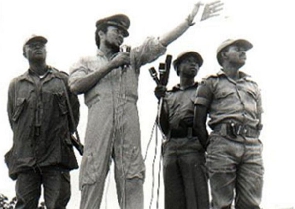 Rawlings (with a microphone) and other junior officers staged a coup in 1979 to take power
Rawlings (with a microphone) and other junior officers staged a coup in 1979 to take power
On May 15, 1979, a charismatic and outspoken junior officer in the Ghana Air Force, Flight Lieutenant Jerry John Rawlings, led an audacious but unsuccessful coup attempt against the Supreme Military Council (SMC) government, headed by General Frederick WK Akuffo.
The failed putsch marked a pivotal moment in Ghana’s political history and set the stage for Rawlings’ eventual rise to power.
The 1970s were a period of economic hardships and political instability in Ghana.
Successive military regimes, including the SMC, which had been in power since 1972, struggled to address rampant inflation, unemployment, and widespread corruption.
General Akuffo, who assumed leadership of the SMC in 1978 after deposing General Ignatius Kutu Acheampong, inherited a nation grappling with discontent.
His administration’s attempts at economic reforms and plans for a transition to civilian rule under a “Union Government” failed to quell public frustration.
Rawlings, then 31, had gained a reputation as a fiery critic of the military elite, accusing them of mismanagement and corruption.
On May 15, 1979, he and a group of junior officers and enlisted men attempted to seize control of the government.
The plot, however, was poorly coordinated and quickly thwarted by loyalist forces. Rawlings and his co-conspirators were arrested and detained to face a court-martial.
Far from fading into obscurity, the failed coup propelled Rawlings into the national spotlight.
His outspoken defense during the subsequent public trial resonated with a good section of the Ghanaian populace, who felt disillusioned with the status quo.
Rawlings condemned the SMC’s leadership, famously stating that the military hierarchy had betrayed the nation.
His trial, tagged by critics as intended to suppress dissent, instead amplified his popularity, particularly among the youth and lower ranks of the military.
The events of May 15, 1979, were a precursor to a more successful uprising.
On June 4, 1979, less than three weeks later, sympathetic junior officers and soldiers freed Rawlings from prison, launching a second coup that toppled the Akuffo regime.
The Armed Forces Revolutionary Council (AFRC), with Rawlings as its leader, assumed power, promising to root out corruption and pave the way for democratic elections.
The AFRC’s brief rule was marked by controversial “house-cleaning” exercises, including the execution of senior military officers, including Akuffo and Acheampong, which remain divisive in Ghana’s historical memory.
Rawlings’ actions, though initially unsuccessful, laid the groundwork for his emergence as a transformative figure in Ghanaian politics, leading to his later presidency from 1981 to 2001.
GA/AE
Watch as Paul Adom Otchere offers advice to NDC footsoldiers
